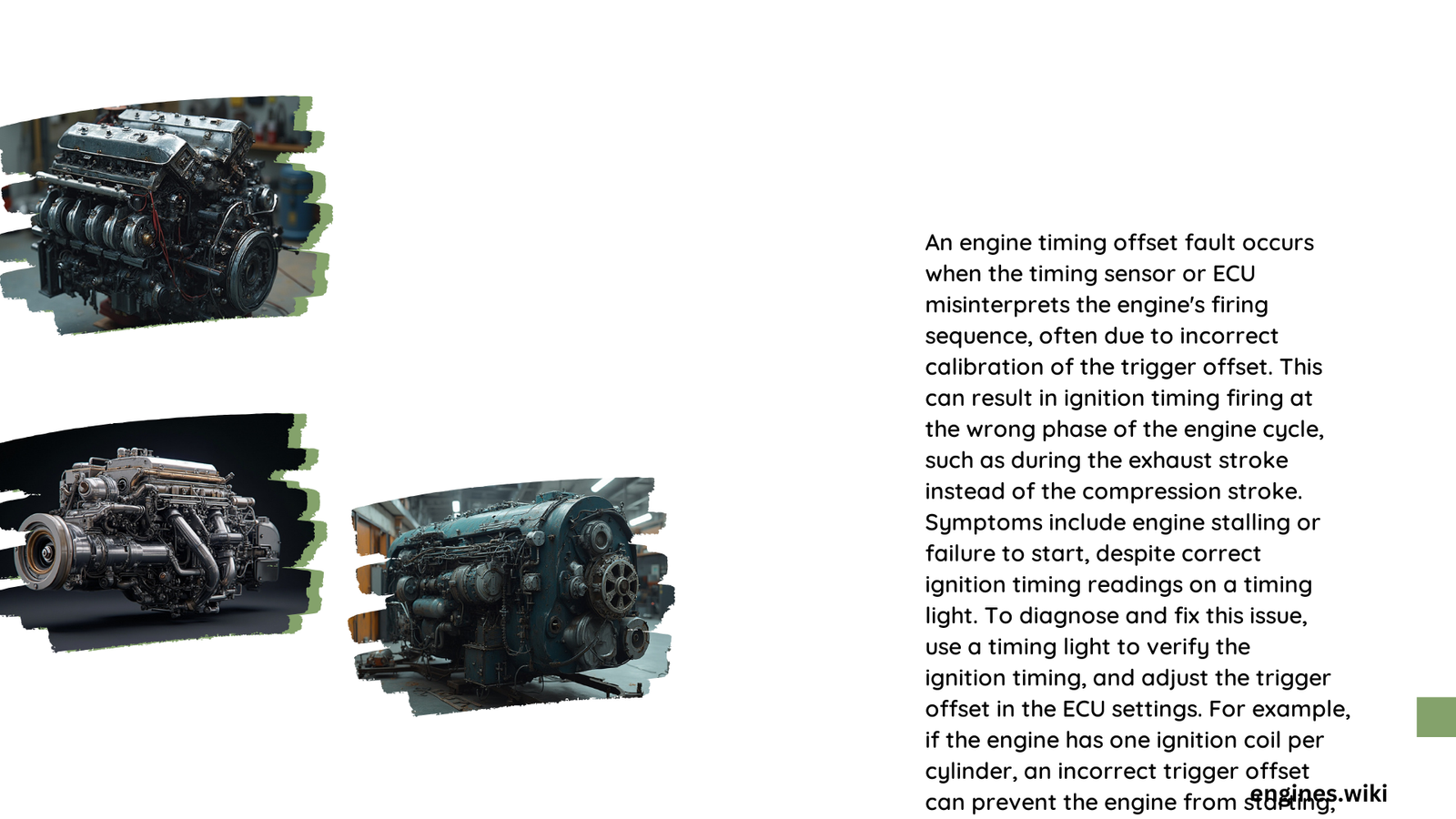Engine timing offset fault is a critical issue that can significantly impact vehicle performance and efficiency. This fault occurs when the engine’s timing is out of sync, potentially leading to misfires, reduced power, and increased fuel consumption. Understanding the causes, diagnostic procedures, and solutions for engine timing offset faults is crucial for maintaining optimal engine performance and preventing costly repairs.
What is an Engine Timing Offset Fault?
An engine timing offset fault refers to a discrepancy between the expected and actual timing of engine events, such as valve opening and closing or fuel injection. This misalignment can be caused by various factors, including sensor malfunctions, mechanical wear, or software issues. Proper engine timing is essential for efficient combustion and optimal performance.
What are the Common Causes of Engine Timing Offset Faults?

Several factors can contribute to engine timing offset faults:
- Faulty timing sensors (crankshaft or camshaft position sensors)
- Worn or stretched timing belts/chains
- Damaged or misaligned timing gears
- Software calibration issues in the Engine Control Module (ECM)
- Mechanical wear in engine components
How to Diagnose an Engine Timing Offset Fault?
Diagnosing an engine timing offset fault requires a systematic approach:
- Use a diagnostic scan tool to check for error codes
- Inspect timing belts/chains for wear or damage
- Test timing sensors for proper function
- Verify timing marks alignment
- Perform compression and leak-down tests
- Check ECM software for updates or calibration issues
What Tools are Needed for Engine Timing Offset Fault Diagnosis?
To effectively diagnose an engine timing offset fault, you’ll need the following tools:
- Diagnostic scan tool
- Timing light
- Multimeter
- Compression tester
- Leak-down tester
- Specialized timing tools (specific to vehicle make/model)
What are the Symptoms of an Engine Timing Offset Fault?
Common symptoms of an engine timing offset fault include:
- Engine misfires
- Reduced power and acceleration
- Poor fuel economy
- Rough idle
- Check Engine Light illumination
- Difficulty starting the engine
- Unusual engine noises (knocking or ticking)
How to Fix an Engine Timing Offset Fault?
Fixing an engine timing offset fault depends on the root cause:
- Replace faulty timing sensors
- Replace worn timing belts/chains
- Adjust or replace timing gears
- Update ECM software
- Repair or replace damaged engine components
What is the Cost to Repair an Engine Timing Offset Fault?
The cost to repair an engine timing offset fault can vary widely depending on the cause and the vehicle make/model. Here’s a general breakdown:
| Repair Type | Estimated Cost Range |
|---|---|
| Sensor Replacement | $100 – $500 |
| Timing Belt/Chain Replacement | $500 – $2000 |
| ECM Software Update | $100 – $300 |
| Major Engine Repair | $1500 – $5000+ |
Can Engine Timing Offset Faults be Prevented?
While some engine timing offset faults are unavoidable due to normal wear and tear, preventive measures can help:
- Follow manufacturer-recommended maintenance schedules
- Replace timing belts/chains at specified intervals
- Use high-quality replacement parts
- Address check engine lights promptly
- Perform regular oil changes and tune-ups
What are the Long-term Effects of Ignoring an Engine Timing Offset Fault?
Ignoring an engine timing offset fault can lead to severe consequences:
- Catastrophic engine failure
- Bent or broken valves
- Piston and cylinder damage
- Increased repair costs
- Reduced engine lifespan
- Decreased vehicle resale value
How Does Engine Design Affect Timing Offset Faults?
Different engine designs have varying susceptibilities to timing offset faults:
- Interference vs. Non-interference Engines: Interference engines are more prone to severe damage from timing issues.
- Belt vs. Chain-driven Timing: Chain-driven systems generally last longer but can be more expensive to repair.
- Variable Valve Timing Systems: These advanced systems can introduce additional complexity and potential fault points.
What Role Do Engine Control Modules Play in Timing Offset Faults?
Engine Control Modules (ECMs) play a crucial role in managing engine timing:
- Interpret sensor data to adjust timing
- Compensate for wear and environmental factors
- Store fault codes for diagnostic purposes
- Require periodic software updates to maintain optimal performance
Understanding the intricacies of engine timing offset faults is essential for both vehicle owners and mechanics. By recognizing the symptoms, understanding the diagnostic process, and knowing the potential solutions, you can address these issues promptly and effectively, ensuring your engine runs smoothly and efficiently for years to come.
References:
1. The Diesel Page Forums
2. MINI Cooper Forum
3. Eng-Tips
